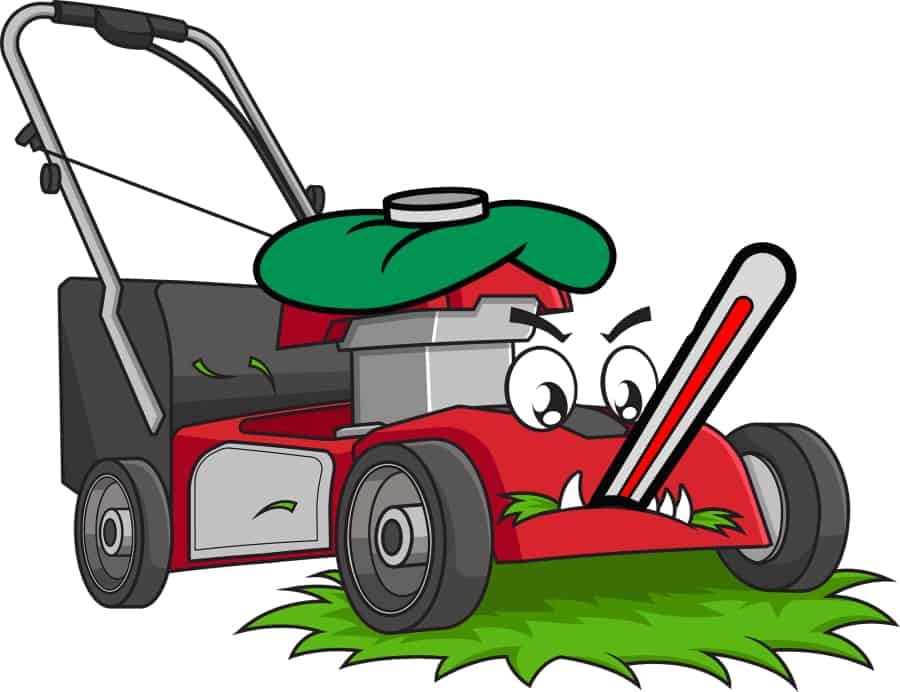Oil is the precious liquid that has always been a vital part of combustion engine technology. Your lawn mower is no different and its dependence on oil cannot be understated. But what would happen if you left old oil in your mower?
If you don’t change the oil in your mower…
- Your engine could run rough and excessively smoke.
- You may ruin parts by allowing too much friction to build with use.
- Your engine may need overhauling by a qualified small engine repair specialist.
- You may need to replace your entire mower.
Today, we take a look at the role of oil in your mower’s engine performance and longevity. We will then discuss oil management and the consequences of not maintaining consistent oil levels and quality. Let’s get started.

Contents
Not Changing The Oil In Your Mower Can Lead to Problems
If you don’t change the oil in the mower, you will inevitably face issues.
Accelerated wear and tear on a mower engine is the main condition caused by foregoing oil changes, leaving old or low oil. It can be prevented from lubricating parts that would normally rub and cause friction if the quality is allowed to deteriorate or the levels become low.
Let’s look at these two main problems not changing the oil can cause.
Firstly, The Oil Will Eventually Age.
The older your oil gets, the less lubricative it will be. Without proper lubrication, engine parts will rub against each other, resulting in degraded engine performance. This friction is also bad news for your engine’s longevity.
Secondly, The Oil Level May Eventually Run Low.
When the level of oil begins to get low it begins to lose its ability to properly lubricate the engine. The result is low ‘pecking’ sounds, which is an indication that damage may already be occurring.
This has even worse effects than aged oil and prolonged operation of the mower will result in faster wear and tear, dark exhaust smoke, and even total engine failure.
If you are wanting two things to make your next mower oil change cleaner and easier, I suggest these from Amazon…
- The Lumax 15 Quart Drainmaster Drain Pan and Waste Oil Storage
- The Drymate Oil Spill Premium Absorbent Mat
How Do You Know When Your Lawn Mower Needs An Oil Change?
Just like your car, a combustion power lawnmower requires the occasional oil change. The ability to identify when that time comes will save you a lot of problems and, potentially, a lot of money.
Luckily, there are several ways of determining this. The easiest way is to simply track the number of hours you’ve clocked with the lawnmower.
Most 4-stroke mower engines require an oil change after every 40-50 hours, but you should consult your instruction manual to be sure. Some lawnmowers even have counters that display their work hours. Once a routine is established, set times can be scheduled.
For a new lawnmower, the oil must be changed after the first five hours of operation. After this initial change, you can follow the manufacturer’s recommended oil change schedule.
You should also feel free to change the oil at the beginning of the mowing season if the mower had been stored away for a long time. You can even remove the oil before putting your mower away for the winter, but do not forget this when the next mowing season rolls around.
If you enjoy this article, you will also like…
- Which Way To Tip A Lawn Mower On Its Side? (Find Out Here)
- What Kind Of Gas To Put In A Lawn Mower?
- What To Know About A Lawn Mower Running Slow And Rough
Oil Condition Can Signal A Mower Oil Change
Another way to see if it’s time for a change is to simply check the oil levels and quality. We recommend checking your oil while the mower is still cool, as most of the engine oil will still be in the crankcase at this point.
The mower’s dipstick will indicate the oil level, while a few drops of oil on a piece of tissue paper will help you determine the quality. The darker the oil is, the older it is and the greater the need to change it.
Performance Can Be A Sign That The Oil Needs Changing
Engine oil also has a bearing on various aspects of your lawnmower’s performance. As a result, several performance changes may indicate a need to change your oil.
One common performance issue is reduced power output. You may find that it takes a significantly longer time to cut your lawn, for example. Other times, you may find that the mower engine runs much slower than normal.
Oil is responsible for lubricating vital parts of the engine, most of which are made of metal. If the oil loses its lubricative qualities, or if the levels drop sufficiently, these parts will be forced to grind against each other, which taxes the engine and causes power loss and other performance issues.
A slower engine will also cause the mower blades to spin slower, resulting in increased mowing times. The movement of self-propelled walk-behinds and riding mowers may also start to slow if your oil needs a change.
Performance issues will, more likely than not, result in fuel efficiency issues. If you find yourself re-fueling your mower more frequently than usual, your oil level or quality may be the root cause.
The lawnmower’s exhaust can also signal when it’s time to change your oil. If the exhaust is producing excessively dark smoke, it’s a sign that your oil needs addressing.
How Often Should You Change The Oil In A Lawn Mower?
As we’ve already discussed, the frequency of oil changes can depend on the type, model, and make of the mower.
Of course, lawnmowers with 2-cycle engines do not require oil changes since they get all their lubricative needs from the oil and gas mixes they run on.
For most walk-behind mowers with 4-cycle engines, you should change the oil after 40-50 hours of use. Some machines require oil changes as early as the 20-hour mark, so pay attention to your instruction manual. You can then schedule regular changes.
Almost all riding mowers have 4-cycle engines, which means they require oil changes from time to time. Typically, you should change your riding mower’s oil every 50-100 hours. Again, you want to consult your manual or your dealer to be certain. Some brands, like John Deere, attach a service and oil change schedule to the mower itself.
If your walk-behind or riding mower is new, you should add oil to it before running it for a few hours, usually five hours. After this point, you should change the oil and follow the regular schedule.
Will Too Much Oil Prevent A Lawn Mower From Starting?
There is a reason why most lawnmowers have marked out fill-up points.
Too little oil will result in you running the lawnmower dry, which will cause the wear and tear issues we discussed above.
However, too much is also a problem.
Too much oil in a lawn mower can cause two problems. It can create a sluggish start and an uneven running engine on the less serious end. A more dire situation is if it causes hydro-locking and the mower can’t be started at all unless the cylinder is drained of excess oil.
You see, oil’s regular function is to lubricate parts of the engine. The piston, which is located in the engine cylinder, is one of these parts. Oil helps the piston move up and down the cylinder easily.
The problem with adding too much oil is that the liquid will eventually occupy the space above the piston in the cylinder.
This problem isn’t much of a concern if the piston is in the top dead center position on its compression stroke (i.e., at the top of the cylinder) because oil won’t be occupying too much space in the cylinder. In such a case, the machine may have a hard start and let off white smoke when you start it.
However, if the piston is at the bottom of the cylinder, the oil will have much more space to cause serious problems. Adding too much oil will result in the liquid occupying the majority of the space in the cylinder.
When you try to start the machine, the piston will not be able to move upwards to create pressure for combustion. This is known as hydro-locking, and it will prevent the mower from starting until the cylinder is drained of oil.
The Final Touches On Not Changing The Oil In Your Mower…
To get right to the point, change the oil in your mower regularly. Deciding that it will all be fine because you don’t use the mower all that often can cause you to have to replace parts or even the entire mower.
It is not just an issue with smoking exhaust or a bit of a rougher running engine. It can cause an engine to become inoperable just like in an automobile.
Be nice to your mower and it will server you well for many years to come.
To read more great articles (if I do say so myself) check out some of my others here…
- Which Way To Tip A Lawn Mower On Its Side? (Find Out Here)
- What Kind Of Gas To Put In A Lawn Mower?
- What To Know About A Lawn Mower Running Slow And Rough
References
https://www.youtube.com/watch?v=eeEVigsVqrE&ab_channel=Steve%27sSmallEngineSaloon
